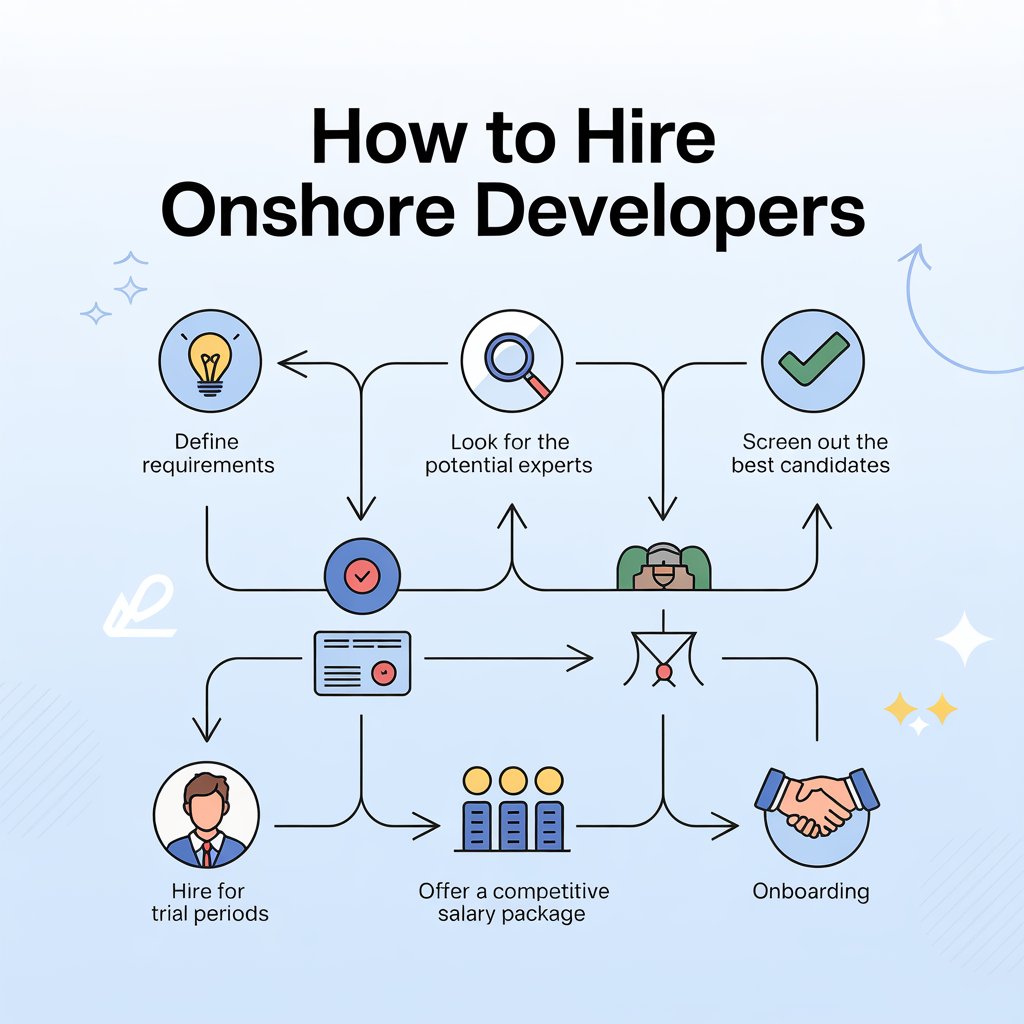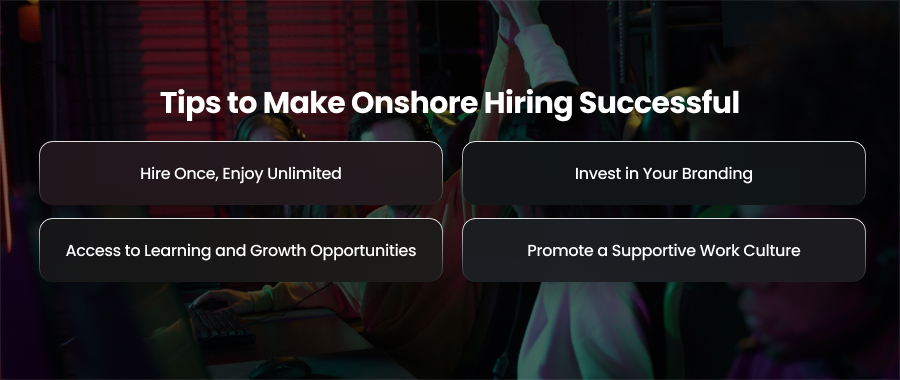Do you know that companies now often don’t prefer to handle their software development tasks? Instead, they hire onshore developers to fulfill their software development needs, keeping all the hassle out of the core business processes.
A recent study shows, around 66% of U.S. businesses have outsourced at least one department. Another astonishing fact is, over 64% of IT leaders globally prefer outsourcing software work, as they have their software built by outsourced teams.
Hence, such figures prove the relevance of software development outsourcing regardless of the outsourcing type. This article will focus on onshore development, its benefits, onshore developers, and tips for hiring onshore developers.
So, let’s begin!
What is Onshore Development?

Onshore development is the type of outsourcing in which the development resides in the same city or country as the hiring company. Moreover, onshore development works in the same time zone and legal jurisdiction.
Onshore Development is Ideal for:
- Projects requiring close collaboration
- Projects where regulatory compliance is required
- Data-sensitive projects
Example of Onshore Development
A U.S.-based company with an office in California wants to develop software, and they hire onshore developers from various states in the USA as an example of onshore development.
Why Onshore Development Stands Out?
Understanding what onshore development offers to you holds strategic significance in accomplishing your project re quirements. Whether you opt for onshore development, nearshore, or offshore, you must know what benefits you will gain.
Enhanced Communication and Collaboration
Firstly, the top benefit of onshore development is improved communication and collaboration. Since the onshore developers work in the same time zone, communication becomes easier and has fewer cultural differences.
Teams easily have face-to-face meetings, leading to better project understanding and ultimately, timely and efficient delivery.
Onshore Members Better Understand the Local Requirements
Secondly, if you are building a project for the local market, your hired employees will have a better understanding of the local market compared to the offshore or nearshore developers. Hence, by leveraging the onshore development services, you can better align with local
business requirements, regulations, and target audiences.
Legal and Regulatory Compliance
Moreover, there are nearly zero issues for legal and regulatory compliance. It is due to the easy adherence to local data protection laws, simplified contracts, taxes, and labor laws.
Better Project Quality
When developers work in the same country or area, there are more chances to achieve a high-quality project. At the same time, you enjoy better accountability of your team and keep an eye on their work.
Furthermore, at the time of hiring, you can easily perform background checks and validate portfolios of the potential developers.
Faster Turnaround with Agile Development
Mostly, agile development methodologies are followed while working with outsourced teams. This allows you to have sprint planning and stand-up meetings that allow to have a complete follow-up of the work. This reduces the possibility of the occurrence of potential delays and speeds up the turnaround time.
Onshore vs Offshore vs Nearshore – A Quick Comparison
Here is a quick comparison between the three common outsourcing models. Understanding this comparison will help you choose the right hiring model for your project.
| Aspect | Onshore | Offshore | Nearshore |
| Cost | Higher costs, very expensive | High costs, very expensive | Moderate |
| Communication | Easier | Difficult | Moderate |
| Time Zone | Same | Different | Similar |
| Legal Issues | No | Complex | Fewer |
| Quality Control | High | Depends on the developers | Moderate to high |
Offshore vs Onshore Development: Which One Saves More Money? Read Here!
When To Choose Onshore Development
- You prefer data security and legal compliance to be a priority for your project.
- Businesses require ongoing collaboration and in-person support.
- Projects requiring seamless communication and collaboration.
- When you don’t want any cultural differences among team members.
- A project with tight deadlines should be completed with onshore development.
Onshore Developers – A Brief Intro
The developers working on onshore projects, whether individually or in an agency, are onshore developers. They are located in the same country as the company hiring them. Hence, they work in the same time zones, possess the same culture and language, and have no to very minimal differences.
Where to Find Onshore Developers
If you want to hire onshore developers for your project and you are in the dark about what to do next, read the points below. This will help you find the right developers for your project.
- Online Freelance Platforms
Firstly, there are online freelance platforms that will help you in fulfilling the onshore developer requirements. You can hire as many freelancers as you want. All you have to do is search for developers in your region with the required skills and experience.
Secondly, you have the opportunity to use LinkedIn, where you can find professionals willing to work within your network. Adjust your search settings according to your requirements and location, and you will easily find onshore developers.
- Onshore Agencies
Lastly, you can look for agencies that have the resources you need. All you have to do is contact such agencies, convey your requirements and expectations. They will find the best match resource for you who will work on an onshore model with you.
How to Hire Onshore Developers – Step-by-Step Guide

Besides learning the platforms to hire onshore developers, you need to be aware of the steps involved in hiring the best onshore software experts.
Step 1: Define Project Requirements
Whenever you hire experts relevant to the software industry, this will be the first step, regardless of how complicated your project is. It is very important to know what you are looking for.
For this:
- Understand your project goals.
- List down the specific and unique features that you want.
- What are you onto: web application, mobile application, or both?
- Project timeline and budget
- Target audience of the project.
These are some core things you need to understand before initiating the hiring process.
Step 2: Look for the Potential Experts
Once you are done with the requirements, it’s time to find the best resources for your project. You must look for developers with prior onshore development experience and a proven portfolio of demonstrating solutions in this model.
Here are things that you need to take care of while hiring onshore experts:
- Look into their previous experience and expertise. Check their record of working for onshore clients.
- Examine their portfolio and previous projects. Look into their capabilities and creativity.
- Assess their communication and collaboration skills, and their ability to meet tight deadlines.
- Evaluate their problem-solving and technical skills.
- Prefer the developer with exceptional onshore software development expertise capable of providing long-term support.
Step 3: Screen Out the Best Candidates
Based on your findings, screen out candidates that you understand have the potential to meet your requirements. Don’t forget to test them with a technical assessment. Passing them through the technical assessment will leave no doubts regarding their capabilities.
Step 4: Hire For Trial Periods
In a few cases, you may opt to hire resources with less experience on a trial period. This helps you evaluate the candidate in a better way, and if he fulfills your expectations, they becomes an integral part of your project.
However, if they fail, it is still better for you.
Step 5: Offer a Competitive Salary Package
If you are hiring yourself, you need to offer a competitive salary package along with perks and benefits to your new onshore hiree. The salary should be according to the region so that your resource won’t leave your project midway due to a low salary.
Moreover, you also need to give them the modern-day benefits such as remote work, flexible hours, and bonuses.
Step 6: Onboarding
After you are done with all the above processes, it’s time to onboard the resource. Let him know about the project. Convey your expectations clearly with no ambiguities. Introduce new resources to your existing team members.
Tips to Make Onshore Hiring Successful

We won’t leave you midway. Let’s go through the tips that will make your onshore hiring successful.
Hire Once, Enjoy Unlimited
The onshore market is limited, which means you have to struggle to find the right resources for your project. Hence, when you start hunting onshore developers, engage with top-notch, well-versed, and highly-skilled developers so you might not have to readdress the hiring process.
Invest in Your Branding
Skilled onshore developers not only look for high salaries but also put a keen eye on your company culture, mission, tech stack, and growth opportunities. For this, they check your online presence.
So, you need to invest in your branding. Here’s the list of points you need to follow:
- Keep your company’s LinkedIn profile updated.
- Showcase your previous projects and team achievements.
- Highlight employee success stories.
Access to Learning and Growth Opportunities
Today, big businesses and software companies invest in their employees by offering them new and technical resources to learn. This ensures their personal as well as company growth. For this:
- Give access to online courses and certifications to your onshore employees.
- Encourage them to attend IT conferences and networking events.
Promote a Supportive Work Culture
Lastly, build an environment where everyone feels comfortable and secure. Promote work-life balance by giving remote work days, a hybrid work environment, and providing mental health support. Such things tend to bring in skilled people to your company.
Common Mistakes to Avoid in Hiring Onshore Developers
Mistakes are a part of the hiring process, but some mistakes can prove costly. Here’s a list of things you need to watch out for:
- An exceptional CV is not proof that the person would be skilled enough to tackle intricate projects. Hence, you need to assess their technical skills by giving an assessment.
- Never ignore soft skills. A person with strong technical skills and zero soft skills can prove drastically bad for your project.
- Never initiate a project with ambiguous goals or requirements. Ensure to kickstart the project once it has complete requirements, timelines, budget, and clear expectations.
- Remember, onshore software development is costly compared to offshore development. Thus, looking for a low-salaried developer will ultimately put your project at stake as you will compromise on skills and expertise while looking for a low-budget developer.
- Lastly, never hire onshore developers for a single or short-term project. Onshore development suits long-term projects with complex requirements.
The Last Word!
In conclusion, onshore software development is the best choice for individuals and companies looking for high-tech solutions with smooth communication and collaboration. Undoubtedly, the costs of onshore development are significantly higher than offshore and nearshore development, but it prioritizes communication, quality, and compliance.
Hence, if you want to make the most out of onshore development, you need to understand when you should opt for hiring onshore developers. Moreover, follow a structured hiring process to avoid any complications.




